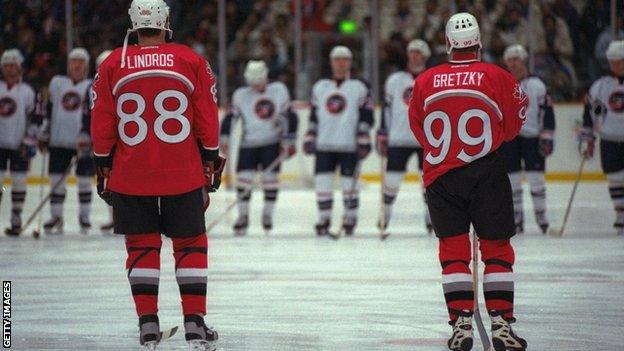National Hockey League will not let players go to 2018 Pyeongchang Winter Olympics
- Published

The biggest names in ice hockey have been competing at the Winter Games since Nagano in 1998
The best ice hockey players in the world will be missing from the 2018 Winter Olympics in Pyeongchang after the National Hockey League said it will not allow players to go to the Games.
The owners of the league's 30 clubs are unhappy at having to halt the season for three weeks for the Games.
The NHL is regarded as the world's top ice hockey league, featuring players from every major hockey-playing nation.
"We now consider the matter officially closed," an NHL statement read.
The NHL had been seeking concessions from the International Olympic Committee to compensate it for interrupting its season but will now not schedule a mid-season break for the Games.
It had been in long-running talks with the IOC and the NHL Players' Association as well as the International Ice Hockey Federation, which had offered to cover travel and insurance costs for NHL players as a concession to the league.
"A number of months have now passed and no meaningful dialogue has materialised," the NHL statement read., external
The IOC responded by saying it felt "very sorry for the athletes".
"The decision is even more regrettable, as the International Ice Hockey Federation (IIHF) had offered the same conditions to the NHL as at previous Olympic Games, where the insurance and travel costs were covered," a statement read.

NHL players have appeared at every Winter Olympics from 1998, with an average of more than 140 players leaving for the Games during Olympic years.
Countries whose first-choice sides are made up almost entirely of NHL players, such as Sweden, Finland, Russia, the United States and Canada, now face having to draw players from other leagues, such as European professional leagues.
However, many players, external were reportedly still keen to play in South Korea. Russia's Alex Ovechkin, a winger for the league-leading Washington Capitals, has previously said he will attend the Games regardless of the NHL's decision.
The United States Olympic Committee's chief external affairs officer, Patrick Sandusky, said he was "disappointed" by the decision.
Analysis
Seth Bennett, BBC World Service
The NHL has put club above country and that will not sit well with some of the sport's biggest assets, who may decide to take a stand.
The NHL has played hardball with the sport's world governing body and it is a risky move. For many European players, this is their one chance to really connect with home and they will have a big decision to make - potentially sacrifice a career in North America to play for their country. The players' association says it is "extraordinarily disappointed and adamantly disagree", adding that "a decent respect for the opinions of the players matters".
Although the NHL considers the matter to be closed, it is hard to imagine that it would be able to do much to stop all the best players if they decided they wanted to go. The prospect of a team having to sue a superstar player for breach of contract, while at the same time using them to promote their club is, uncomfortable.